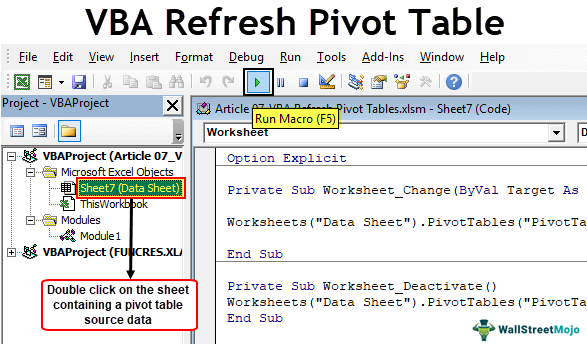Table Of Contents
Excel VBA Refresh Pivot Table
When we insert a Pivot Table in the sheet, Pivot Table data does not change itself once the data changes. So, we need to do it manually. But in VBA, there is a statement to refresh the Pivot Table: expression.refreshtable. Using this, we can refresh the Pivot Table by referencing the worksheet or refer to the entire Pivot Tables in the worksheets and refresh them all at once.
The Pivot Table is vital in analyzing the huge amount of data. It helps in analyzing, summarizing, and making useful data interpretations. However, one of the problems with this Pivot Table is it will not automatically get refreshed if there is any change in the source data. Instead, the user has to refresh the Pivot Table by going to the particular Pivot Table whenever there is a change. But say goodbye to the manual process because here, we have the method to refresh the pivot table as soon as you make any change in the Pivot Table.
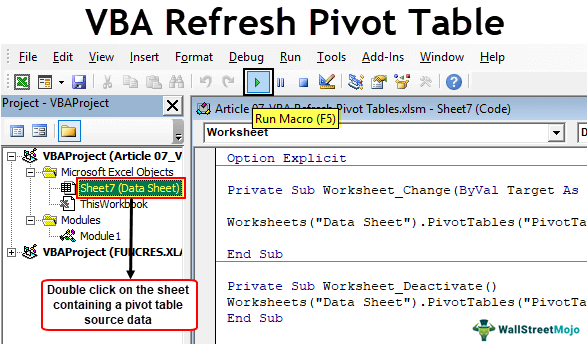
How to Auto Refresh Pivot Table Data VBA Code?
The only time the pivot table needs to be updated is whenever there is any change in the source data of the Pivot Table we are referring to.
For example, look at the below data and Pivot Table.
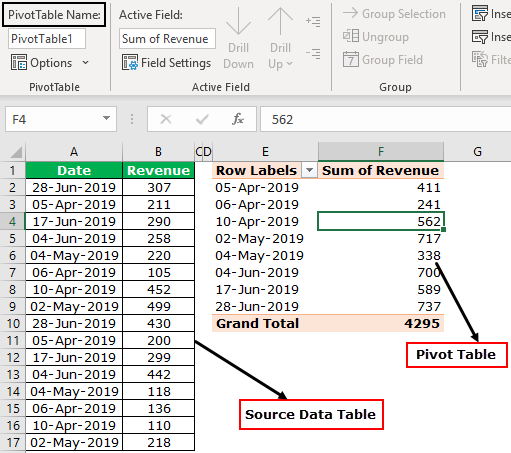
Now, we will change the numbers in source data: from A1 to B17.
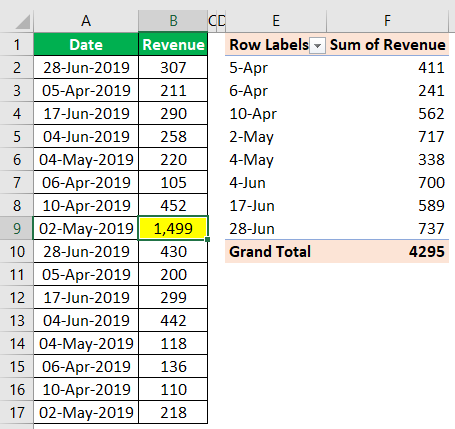
In cell B9, we have to change the value from 499 to 1499, i.e., a 1000 increase in the data. But, if you look at the pivot it still shows the result as 4295 instead of 5295. So, we have to refresh my Pivot Table to update the Pivot Table manually.
To overcome this issue, we need to write a simple excel macro code to refresh the Pivot Table whenever there is any change in the source data.
#1 - Simple Macro to Refresh All Table
Step 1: Change the Event of the Datasheet
We need to trigger the change event of the datasheet. Then, in the Visual Basic Editor, double-click on the datasheet.

Once you double-click on the sheet, select “Worksheet” and select the event as “Change.”

You will see an auto sub procedure opened as Worksheet_Change(ByVal Target As Range)

Step 2: Use Worksheet Object
Refer to the datasheet by using the Worksheets object.

Step 3: Refer Pivot Table by Name
Refer to the Pivot Table name by the name of the Pivot Table.

Step 4: Use the Refresh Table Method
Select the method as “Refresh Table.”

Now, this code will refresh the Pivot Table “PivotTable1” whenever there is any change in the source data sheet. You can use the below code. First, you have to change the Pivot Table name.
Code:
Private Sub Worksheet_Change(ByVal Target As Range) Worksheet("Data Sheet").PivotTables("PivotTable1").RefreshTable End Sub
#2 - Refresh All Pivot Tables of the Same Worksheet
If you have many Pivot Tables in the same worksheet, you can refresh all the Pivot Tables in a single click itself. For example, use the below code to refresh all the Pivot Tables in the sheet.
Code:
Sub Refresh_Pivot_Tables_Example1() Worksheets("Data Sheet").Select With ActiveSheet .PivotTables("Table1").RefreshTable .PivotTables("Table2").RefreshTable .PivotTables("Table3").RefreshTable .PivotTables("Table4").RefreshTable .PivotTables("Table5").RefreshTable End With End Sub
It would help if you changed the name of the worksheet and Pivot Table names per your worksheet details.
#3 - Refresh All Tables in the Workbook
We are unlikely to have all the Pivot Tables on the same worksheet. Usually, for each report, we try to add separate pivot tables in separate sheets. We cannot keep writing the code for each Pivot Table to refresh in these cases.
So, we can use a single code using loops to loop through all the Pivot Tables on the workbook and refresh them with a single click of the button.
The below code will loop through each Pivot Table and refresh them.
Code 1:
Sub Refresh_Pivot_Tables_Example2() Dim PT As PivotTable For Each PT In ActiveWorkbook.PivotTables PT.RefreshTable Next PT End Sub
Code 2:
Sub Refresh_Pivot_Tables_Example3() Dim PC As PivotCache For Each PC In ActiveWorkbook.PivotCaches PC.Refresh Next PT End Sub
Both the codes will do the refreshing Pivot Tables.
If you want the Pivot Table to refresh as soon as there is any change in the datasheet of the pivoting sheet, you need to copy and paste the above codes to the Worksheet Change event in that workbook.
#4 - Avoid Loading Time by using Worksheet Deactivate Event
When we use the “Worksheet Change” event, it keeps refreshing even when there is no change in the data source, but if any change happens in the worksheet.
Even if you enter one single dot in the worksheet, it tries to refresh the Pivot Table. So to avoid this, we can use the “Worksheet Deactivate” method instead of the “Worksheet Change” method.
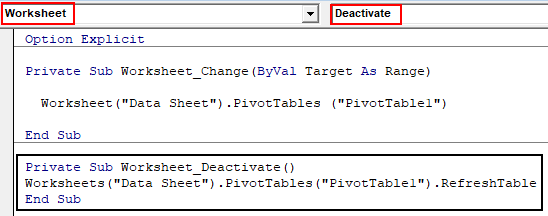
Deactivate the event updates on the Pivot Table when moving from one sheet to another sheet.
